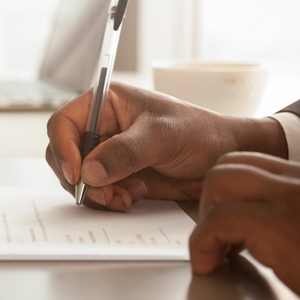|

When you purchase a home the last thing on your list is the mortgage closing. The mortgage closing can be a thrilling, yet nerve-wracking experience for first-time home buyers. However, if everything goes as planned, the day usually ends with a new set of keys.
- What is a mortgage closing—The mortgage closing is when the home buyer and the seller sit down and sign the papers to officially transfer ownership of the property. This is the last step in the home buying process and is also when you confirm all of the details of the transaction.
- Preparing for a mortgage closing—There are a few things you can do before your mortgage closing to get yourself prepared... First, it may prove to be beneficial to do a final walk-through. Make sure that any and all agreed-upon repairs have been made and that everything is as you expect it to be. Second, usually only one type of identification is required, however, it may be helpful to check and make sure that you are not required to bring two. Last, review the Closing Disclosure... take the time to read over it and make sure everything seems to be correct and in line.
- What you do at a mortgage closing—During your mortgage closing you will look over and sign all of your loan documents, you may have to provide papers stating that you have homeowners insurance, and you will need to provide a cashier's check to cover any costs (down payment, closing costs, taxes, insurance, etc.).
- What you sign at a mortgage closing—As a home buyer, you should be prepared to sign a lot of paperwork... However, there are three key documents that you will review and sign:
- The deed of mortgage: The deed of mortgage puts a lien on your property to act as collateral for your loan... In other words, it gives the lender a claim to your home if you fail to pay.
- The mortgage note: The mortgage note is a document stating that you agree to pay the lender at a certain date or on demand. It also specifies the amount of the loan, your interest rate, payments, contract requirements and what the lender can do if you fail to make your agreed-upon payments, as well as other information.
- The Closing Disclosure: The Closing Disclosure outlines the final financial details about the loan you have selected including rate, payment, closing costs, escrow, and other information.
- What you pay at a mortgage closing—Buying a home involves an assortment of costs... Of course, you will have to pay your down payment, but you will also have to pay closing costs, lender fees, third-party charges (appraisals, inspections, etc.), and you'll also pay prepaid items (taxes, homeowners insurance, etc.). At least 3 days before closing, your lender will give you your Closing Disclosure which will list all of your closing costs. You would have received a Loan Estimate within 3 days of application providing estimates of closing costs.
- Who attends a mortgage closing—You will probably see some familiar faces at your mortgage closing: The real estate agent that you've been working with will be there and possibly your mortgage lender and your attorney (if you have one)... However, you will also probably see some new faces, as well. The seller, their attorney (if they have one), their real estate agent, and a notary public may also be in attendance at the mortgage closing.
- How long does the mortgage closing take—While the home buying process may take days, weeks and maybe even months, the mortgage closing should only take a few hours. Once you have dotted all the i's and crossed all of the t's, you can officially call yourself a homeowner!
|
FDIC-Insured - Backed by the full faith and credit of the U.S. Government